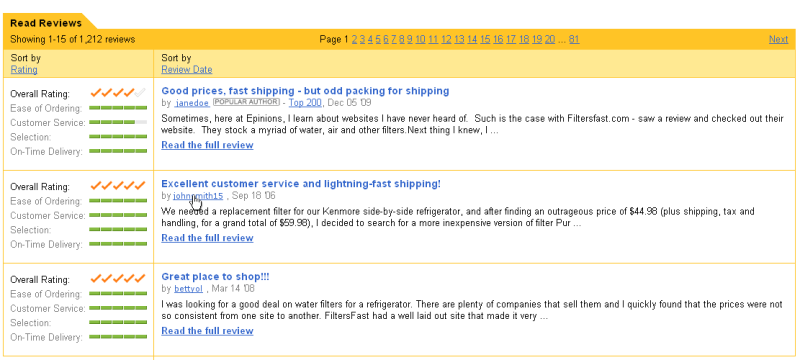The only problem is whether or not you can trust these e-merchants that you find a great bargain on. The old adage, "If it's too good to be true, it probably is," applies here. While you can find good bargains, you risk getting ripped off. So the question is, how can you be fairly certain it is really a good bargain?
The first thing to do is when you find a bargain, check reviews on the seller. That sounds simple enough, but there are a few tricks to remember when doing so. First off, Google the sellers name with the keyword "reviews" so let us use an obscure seller (one that I've used and am happy with) as an example. Go go Google.com and type in filtersfast reviews.
You're not looking for individual product reviews, but something that says any (or a mix) of these phrases in the search results:
- Consumer reviews/ratings
- Store reviews/ratings
- Seller reviews/ratings
- Merchant reviews/ratings
This brought to light many a serious problem. How many other companies were doing this? How would you know? How can you protect yourself?
The easiest answer, is to not just look at a few reviews and decide that the company or the company's product is trustworthy. Treat them as though you don't trust them at all, and fully research them.
When you go to sites that offer customer reviews, and you can use this same method when researching individual products, research the reviewers. This is almost always possible and very simple. Let's look at this for a moment using the same filtersfast reviews that we were looking at earlier.
One of the first results in my search is epinions.com. This is the page (hopefully by the time you read this it still exists) of reviewer results. At the time of this writing, there are 1,212 reviews. That's actually a good sign right off the bat. It's very unlikely any company would pay that many people to give them favorable reviews, so let's pretend there are only three.
As you can see, each reviewer has a link. Obviously the first one is a "popular author" and in the top 200, so I'd say that alone is trustworthy enough, but the second one could be checked. So I click on the reviewers (we call them user) name and I'm presented with a page listing recent reviews John has done. If I see John has only written one lonely review, then I discount that. If John has written several reviews, then this sounds like the real deal.
I don't stop there though, I check the next one too. I check as many as are there, and then I check other sites too. Generally speaking if I can verify that a number of people say that the company is good, then I feel better about buying from them. If a number have unfavorable reviews, then obviously I'm not going to trust them.
This is not without problems though. People are often quick to complain, but are not so inclined to compliment. Because of this, it is easier to find more complaints than those that are satisfied. People tend to get very vocal when they're upset and not so much when they're happy about it. This throws off the balance. So when you see a number of complaints keep in mind that there are probably the same number of happy customers who didn't feel the need to write a review. Just take it into consideration.
Finally, if you can't find any reviews at all, then it is probably best to skip the seller. It doesn't mean they're out to rip you off. It could be a new business, or again, one that has had a bunch of happy customers and not any unhappy ones (yet). Still, if in doubt, toss it out. Do NOT assume that because there are no reviews, the business is legitimate. It may very well not be and it just is not worth the risk.
Overall, I've not had any problems (yet) that I can think of when following it this way. You just must be diligent on your research before purchasing, even if the product is only $5 because you're giving them your credit card information. You don't want to find bills later for $5,000!
Take your time and make yourself feel comfortable. You'll get the hang of it.

No comments:
Post a Comment